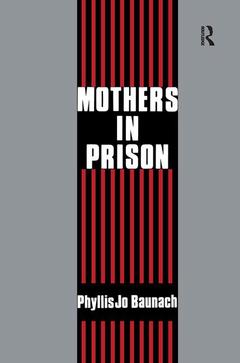Mothers in Prison (2nd Ed.)
Coordonnateur : Ricci Gabriel R.

Several years ago, Terry Moore, a young first offender at the Florida Correctional Institution for Women, gave birth to a baby whose father was a prison guard. Mrs. Moore won the right to have her baby stay with her in prison until she was released a few months later. Although this incarcerated mother was reunited with her child shortly after giving birth, many inmate mothers are not able to be with or see their children on a regular basis during incarceration. Little is known about this significant and emotionally traumatic problem that confronts nearly two-thirds of incarcerated women.
Building upon previous work, this extraordinarily insightful volume offers fresh perspective on issues which surround the separation of inmate mothers and their children, using questionnaire, standardized scales, and individual taped interviews. The author examines issues such as the impact of separation by race; the child's whereabouts at the time of the crime; the child's placement and legal custody during the mother's incarceration; inmate mothers' interest in resuming the parental role after release; child-rearing attitudes of inmate mothers; and the effects of the involvement of drugs on the mothers' relationship with their children.
Through interviews with administrators, staff, and inmates, Dr. Baunach provides a detailed, descriptive analysis of the development and operations of programs to retain mother-child bonds in women's prisons in a variety of states. Dr. Baunach discusses day-long/overnight/weekend visitations, foster care placements, and similar problems of the sort that mothers in prison uniquely must face. The work also has a strong policy content, providing unique and practical recommendations for policies and programs benefiting inmate mothers and children that at the same time can be implemented within the framework of current penological practices.
Date de parution : 01-1985
15.2x22.9 cm
Date de parution : 03-2018
15.2x22.9 cm
Thème de Mothers in Prison :
Mots-clés :
Belle View; Louisville Metropolitan Area; women’s prisons; Vice Versa; mother-child bonds; Child’s Welfare; legal custody; Mother’s Incarceration; foster care placement; Bond Maintenance; childrearing attitude; Foster Mothers; Black Mothers; White Mothers; Drug Involvement; Foster Parents; ACLU National Prison Project; Eleventh Grade Education; Girl Friend; Limited Institutional Support; Prior Felony Convictions; Longer Shifts; Large Families; Mothers Worked Part Time; Special Visits; Law Enforcement Assistance Administration Grant; Child’s Subsequent Development; Juvenile Criminal Histories; Nursery School Program; Natural Mother



